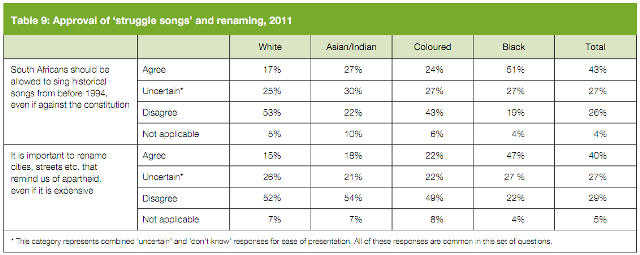South Africans want a United Nation - IJR Survey
The gap between rich and poor is the biggest impediment standing in the way of South African reconciliation. And, while historic racial divides still exist, 66% of ordinary South Africans want to cross boundaries and form a united nation.
These are among the findings of the South African Reconciliation Barometer (SARB) conducted by the Institute for Justice and Reconciliation (IJR) and released this week (see here - PDF). Through a series of focus groups and surveys the researchers measured public opinion on six indicators: political culture, human security, cross-cutting political relations, race relations, historical confrontation and dialogue.
This year, researchers also surveyed opinion on some of the ‘big questions' debated in the public sphere. These ranged from attitudes on the power of the vote in local government elections to approval of the singing of struggle songs, Employment Equity (EE) policy and government re-naming initiatives.
Senior project leader for SARB, Kate Lefko-Everett, says income inequality was the most frequent response to the question, "What is the biggest division in South Africa?" This was followed by political party membership and then race.
"That South Africa remains a deeply divided society is a discouragingly consistent finding of the SA Reconciliation Barometer (SARB) survey," she said.
"However, there are positive signals of progress in reconciliation, social cohesion, nationbuilding, and democratic consolidation, and these should not be overlooked."
The government's commitment to promoting social cohesion and national unity in its Vision for 2030 was cause for optimism.
SARB found that most South Africans believed a united country was both desirable and possible and that levels of interaction and social relationships between people of different historically defined race groups had gradually increased.
"There is a collective interest and commitment to moving ahead from the past, albeit less consensus on exactly how this will happen. We hope that the Vision for 2030 currently being developed by the National Planning Commission will provide us with direction on this challenge," she said.
Nearly half (46%) of South Africans agreed that reconciliation was "impossible" while people who were disadvantaged under apartheid continued to be poor.
Statement issued on behalf of the Institute for Justice and Reconciliation by Evelyn Holtzhausen of HWB Communications, December 7 2011
Click here to sign up to receive our free daily headline email newsletter


